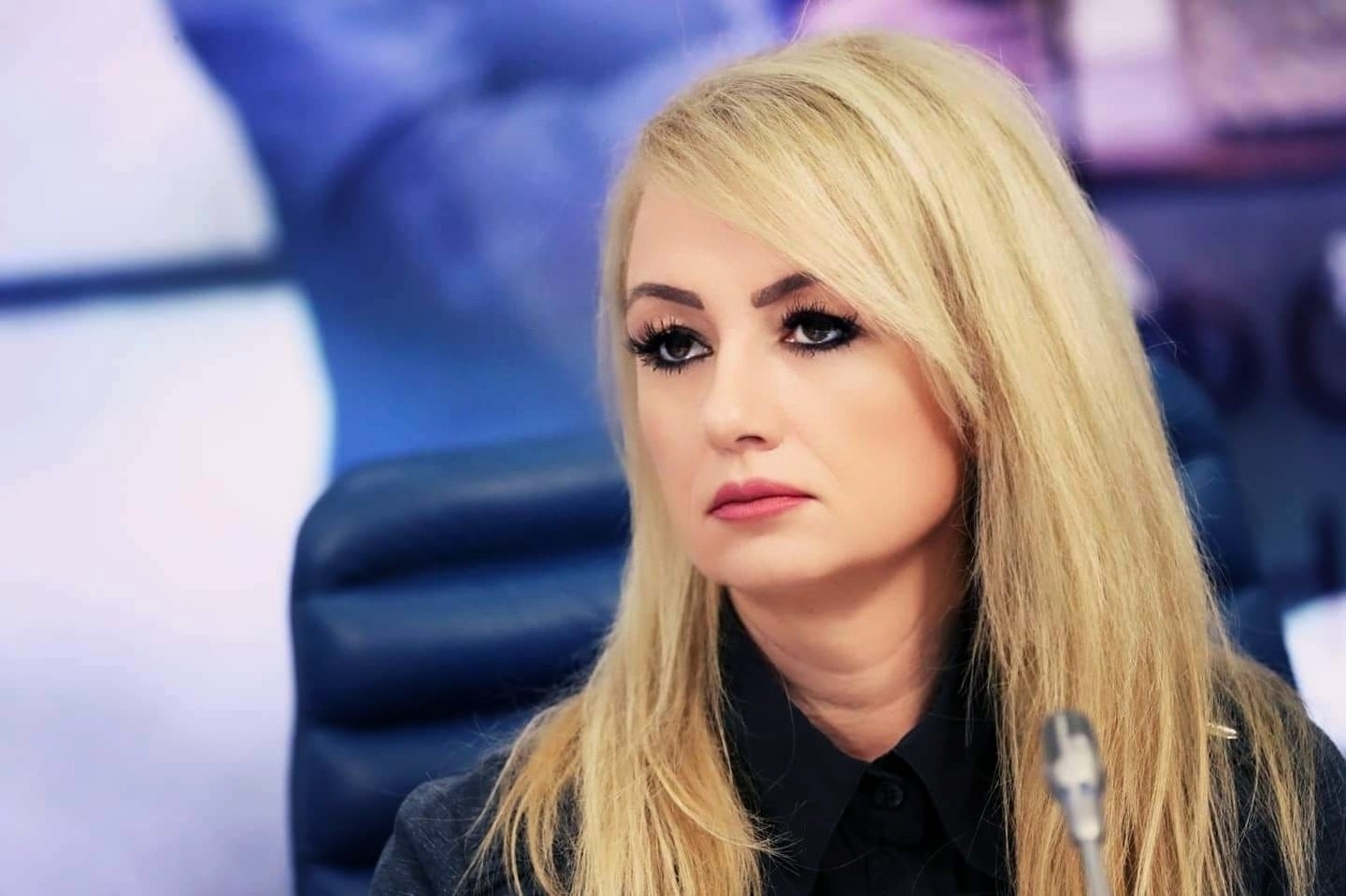Dragana Trifkovic, Director General of the Center for geostrategic studies
Read the first part of the article at the link: Dragana Trifkovic for Russian media: Serbia in a general strike (Part One) - Center for geostrategic studies
- Why Serbs protest
The dissatisfaction of the citizens of Serbia is quite justified. The youth-led rebellion is not politically colored, although the systemic opposition, as before, has tried to infiltrate and impose itself. However, the students did not allow it. Therefore, anyone who analyzes the protests in Serbia, except for the knowledge of the technologies of color revolutions, would have to know, and well, the political situation in Serbia and the state of society. Very superficial statements about the color revolution, only inflame the passions of Dissatisfied Citizens and offend their feelings. The comparison of the protests in Serbia with Maidan does not quite correspond to the facts. Maidan was organized in order to separate Ukraine from Russia and comply with the demands of the EU, and in Serbia we have a situation that the president of Serbia is distancing himself from Russia and increasingly bringing the country under the influence of Euro-Atlantic structures. The protesters in Serbia do not demand Serbia's integration into the EU faster and the majority of Serbian citizens are against European integration, while the authorities persistently reiterate that the strategic goal of their policy is Serbia's accession to the EU. Students protesting in Serbia do not carry EU or NATO flags, but emphasize Serbian symbolism, messages Kosovo is Serbia, carry Serbian flags and sing Serbian songs. But let's start with how we came to mass protests in Serbia. In fact, larger protests in Serbia began in the spring of 2017. years due to doubts about the regularity of the election. For a long time, the majority of Serbian citizens have no confidence in the electoral mechanism in Serbia, which is set up in such a way as to implement pre-determined political solutions adopted by anonymous decision-making centers. This problem has existed since the time of Slobodan Milosevic, and although there have been numerous demands to bring order to electoral procedures, Wednesday voter lists and establish a system of control, it is obvious that external forces correspond to the possibility of manipulating election results.
The elections of that year and the following years were marked by mutual accusations from the regime and the opposition, which led to high tensions. After the elections, the opposition structures gathered around the slogan "one in five million" and then "Serbia against violence" organized protests in front of the Republic electoral commission, when there was a conflict between the protesters and the police. These protests continued with greater or lesser intensity in many Serbian cities until 2020. years and the outbreak of the coronavirus pandemic.
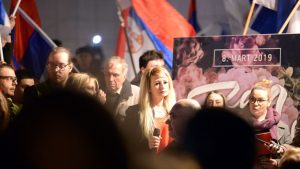
Photo: opposition protests in Novi Sad 2019. (Source: personal archive)
In March 2020. for years, measures were introduced to limit the movement of citizens that lasted until May. They were abolished in order to organize parliamentary elections during which there were no anti-pandemic measures at all. After the election, the government decided to reinstate restrictive measures due to an alleged increase in the number of coronavirus patients. On the same day, mass protests broke out in Belgrade, where police provoked clashes with protesters. Frightened by the mass protests and the strong opposition of the citizens, Aleksandar Vucic decided on the same day not to introduce renewed measures to restrict movement and lock down. The protests against the introduction of measures were practically a continuation of previous protests. New reasons for discontent only increased, and the regime did nothing to remove the causes of the discontent of the citizens or at least alleviate them. A new wave of citizens ' dissatisfaction was caused by the passing of a series of laws during 2021. the law on referendum and popular initiative, and the law on expropriation), by which the regime adapted legislation to the needs of a foreign investor of the English-Australian company Rio Tinto. The deal with this company, which is accompanied by The Voice of an environmental killer, has caused great controversy in society from the beginning. Namely, it is an agreement on lithium mining in Serbia, with potential insurmountable environmental hazards. The deposit of this ore in Serbia is in an area rich in natural resources in the vicinity of which there are clean groundwater for supply, as well as the basin of the river Jadar, which flows into the Great Rivers. The citizens of Serbia correctly understood that the exploitation of lithium without technologies that can guarantee the preservation of the environment (and there are none) would lead to the devastation of this nature-rich area and major pollution of water, soil and air. This caused environmental protests in Serbia, which were larger in size than the previous ones. They were joined by farmers dissatisfied with market conditions that encourage the destruction of the domestic economy.
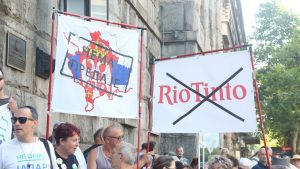
Photo: protests against Rio Tinto in Belgrade [source: Serbian.info)
These protests were accompanied by demonstrations in support of the hand's special military operation since early March 2022. years when people came out en masse to express their support for Russia. They overlapped with the protests for the protection of Kosovo and Metohija and the protest against the Brussels-Washington agreement signed by the regime against the Constitution with Pristina separatists in Brussels and Washington. However, these protests received fierce criticism from both the Serbian regime and the US and Russian ambassadors in Belgrade, who agreed with the regime's assessment that it was a gathering of extremists. The provocation organized by the Security Information Agency of Serbia, which sent a man with a rifle, contributed to this assessment. After that, the systemic "patriotic" opposition, led by Dveri, votive and "independent" intellectuals such as Professor Milos Kovic, organized a gathering for the protection of Kosovo and Metohija at which people shouted "uprising!"while Kovic gave them a very lukewarm lecture on history. In any case, they managed to neutralize the load of the people and put the topic of Kosovo and Metohija in the last plan. During 2022. there were also protests against the organization of a disgraceful gay parade in Belgrade, which competed to host "EuroPride". Despite great public opposition, this parade was held in Belgrade, where half-hearted Revenants tended to pose in front of Serbian churches and monuments. Then it's 2023. mass protests against violence erupted after a student killed nine children and a security worker at the Vladislav Ribnikar primary school in Belgrade and wounded five more students and a teacher. The following day, in the town of Mladenovac near Belgrade, another person killed nine people and wounded another thirteen at two locations. In recent years in Serbia, tension and aggression are all present in society, for which most citizens blame the ruling regime. These tragedies deeply shook Serbian society and mass protests lasted for months. And finally the current protests arose after the tragedy in Novi Sad, when the canopy of a recently renovated railway station collapsed and killed fifteen people. Agreements on the renovation of the railway station as well as the overhaul of the railway line were signed by the regime with a Chinese company in secret, although it is required by law that information of public importance be available to citizens. It is suspected that millions of euros were misappropriated on the renovation project and that the works were carried out without proper procedures. This kind of governance (non-transparency, corruption, non-professionalism) has already become commonplace for state authorities.
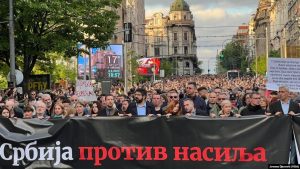
Photo: protests against violence in Belgrade 2023. years (source: Danas.rs)
As can be concluded, the reasons for the protests are numerous and they mainly concern domestic politics. Basically, citizens are dissatisfied with the fact that the ruling regime is making compromises with the West that are directly directed against the state and national interests of Serbia and mismanagement of the state (lithium mining, LGBT propaganda, destruction of the domestic economy, privileged position of foreign investors, surrender of Kosovo and Metohija, danger of environmental disaster, rooted corruption, high degree of criminality, dysfunctionality of institutions, neglect of the interests of citizens by the ruling elites, etc.)
- How a crisis can be resolved
Most of the citizens of Serbia have completely lost confidence in the ruling regime, which is focused exclusively on satisfying the interests of a certain group and on the interests of individuals from the government, and not on the interests of citizens. The government in Serbia has separated and alienated the interests of those it should represent, and at the same time alienated the institutions of the state from its citizens. The high level of corruption that was represented in all institutions was so metastasized during the rule of the Serbian Progressive Party that it led to insecurity. This has a twofold effect in the sense that not only are institutions not functional, but this dysfunction costs citizens dearly. All this United a large number of citizens against the ruling regime, but the ruling regime, by its actions, stirred up passions even more. Several countermeasures organized by the regime in an attempt to change public opinion ended in debacle and showed the regime's weakness. Accusations by the Vucic regime that all those protesting are foreign mercenaries and traitors have even more mobilized the public to revolt. The same mistake was made by Milosevic before the end of his power. It is clear that the Vucic regime cannot survive for much longer and that no one will regret it. But what is the solution? Does Serbia have the ability to change not only the political regime but the entire system that functions as a deep state? Does Serbia have the capacity to resist Western external influences that have been directing political processes in the Balkans for decades? One such opportunity has already been missed after the replacement of Milosevic's regime due to the inability to unite different political structures, the resistance of the system itself, as well as the influence of the West, which is not in the interest of changing the system in Serbia. At the same time, it should be borne in mind that the youth and students, then gathered in the organization "Otpor", were the leading energy of change, as are some other students now. Twenty-five years ago, youth was abused by the West for regime change, and corrupt individuals continued to export color revolutions around the world. Srdja Popovic, once a prominent figure of "Otpor", registered SANVAS (Centre for Applied Nonviolent Action and Strategies) and began training rebels around the world with "nonviolent" regime change methods under the instructions of Gene Sharp, for the interests of the CIA. All hopes of positive change for young people and all citizens were quickly stifled. The biggest problem was that in political structures, but also on the public scene, among intellectuals, businessmen, etc. there were few who were willing to sacrifice for the general interest and many who were willing to sacrifice everything for their own interests.
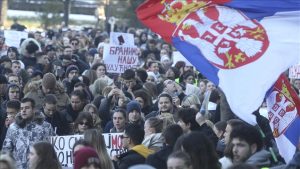
Photo: student protests in Belgrade 2024. (source: aa.com.tr)
The system, i.e. the Serbian deep state, supported by the West, worked on the selection of personnel in this direction so that all those who took care of Serbian state and national interests would be eliminated from the system or marginalized, while at the same time supporting in career development those who were guided by personal interests. Thus, a deeply corrupt system emerged, which metastasized with the coming of the Serbian Progressive Party to power. Therefore, serious changes can only occur by resetting the entire system and changing the paradigm where personnel will be elected to leadership positions that will be guided by Serbian state and national interests. But the West will not allow it because it conflicts with its interests. It should also be borne in mind that the entire political and public scene of Serbia is very much spent. The opposition practically does not exist anymore, so it is funny when Vucic, who integrated into the power of the leading cadres of the former regime, warns that he will not allow "those who destroyed the state"to return again. And the ones he thinks of applaud him from the audience. The Democratic (conditionally pro-Western) opposition (which did not integrate into the Serbian Progressive Party) lost all authority with the citizens after Dragan Djilas, the leader of the opposition, extinguished the citizens ' protests by going to Aleksandar Vucic for negotiations. The patriotic opposition (DSS, Dveri, Zavetnici), due to the effects of the system, the regime and the West, suffered significant changes within the parties that led to their collapse. While part of the patriotic opposition (or rather pseudo-patriotic) was from the beginning connected with the regime of Vucic (Mi Glas from the people), which was later completely exposed. In this way, she lost all authority and importance to the citizens. The system itself is most directed against the emergence of any patriotic organizations and has developed numerous mechanisms to prevent the unification of true patriotic structures. The system itself generates numerous official Patriots that serve to confuse the public, de-escalate patriotism and degrade any healthy idea as best as could be seen in the rapid creation and even faster dismantling of the movement "we voice from the people". Various opposition parties from both the left and right spectrum (pseudo-liberal and pseudo-patriotic) have tried to impose themselves at the forefront of the protests all the previous years, but after many moves that betrayed the trust of citizens, political parties and recognizable figures from politics have become undesirable at the protests of citizens. This is evidenced by the fact that many of them were expelled from the current student protests and were told that they were not welcome.
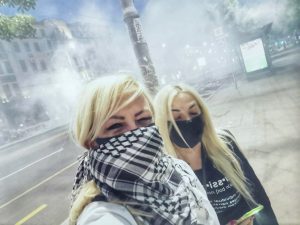
Photo: protests in Belgrade 7. July 2020. (Source: personal archive)
Obviously, in order to politically articulate the protests, there was an opposition initiative of a group of citizens called the "proclamation" formed by nonpartisan public figures. This politically inhomogeneous and obscure group began to occupy an empty space on the public stage and espouse the idea that it is necessary to change the socio-political system as well as the regime. In essence, this is an idea that most citizens can agree with, but the problem is that the newly formed group does not offer a clear program of what kind of socio-political system should be implemented. On the other hand, some recognizable faces from the "proclamation" such as actor Dragan Bjelogrlić (he gained the most popularity with his role in the series "Better Life"), Professor Filip Erdus, Bishop Grigorije Durić, etc. they have a value system that almost does not coincide with the value system of most citizens of Serbia. Let us not go into detail about extreme liberalism, Freemasonry, submission to the West, etc. It should also be borne in mind that this is a group of people who have no experience in government management and that a lot of them come from the world of show business (actors, presenters, singers, etc.). Their presence at student protests does not cause too much revolt, but the question arises what their political agenda is, and above all, who is behind such a gathering and with what intentions. It is completely clear that the West, as before, will use every opportunity to turn political processes in its favor and will not want to allow changes to occur that would jeopardize their interests in Serbia. So the West will impose only cosmetic changes that will not affect the change of the created paradigm. On the other hand, the system, or more clearly, the Serbian deep state, atrophies itself and does not have the power it once had. He has to change himself in order to survive. If we add to that global geopolitical changes that will have a wide impact on everyone, it is clear that despite the great control and influence in Serbia, the West does not have a safe guarantee to preserve its positions. For now, it seems that the West is forcing the Montenegrin scenario in Serbia, where it would change the Government of Vucic (as well as Djukanovic) by agreement, with guarantees that he will not answer before the court, since it is clear that it can no longer keep him in power. Milo Djukanovic became superfluous to the West after recognizing Kosovo, introducing the state into NATO and severing all ties with Russia, while Vucic crowned his career with the surrender of Kosovo (Brussels, Washington and Ohrid accords) and the introduction of NATO into Serbia (SOFA, IPAP), and distancing himself from Russia and sending aid to Zelensky. It is likely that the West will try to build some new leaders from the many robotized and faceless young liberals, but there is little chance that the project will be long-term. On the other hand, the only real way to change the system in Serbia is the sovereignization of the State, positive selection of personnel, strengthening of institutions through professionalization and selection of appropriate personnel, gathering of independent political structures, strengthening traditional, cultural and spiritual values, abolishing monopoly and censorship of media, strengthening of domestic economy, nationalization of alienated state resources etc. Changes can depend not only on external influences, but also on internal ones. In this regard, if the majority of Serbian citizens are ready to really contribute to this, it can give positive results. As the late patriarch Paul said,"We will be better when we are better."
The article was published in the Federal Information and political journal "persona strany"
Start the protest? / Federalny informationno-politikeskogo žurnala "persona Страны"
9. February 2025.

